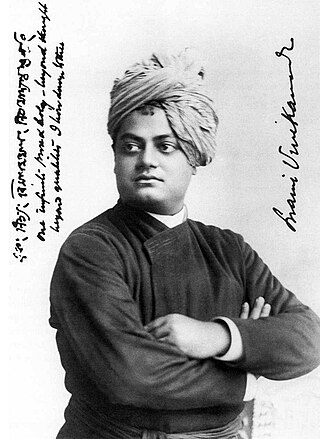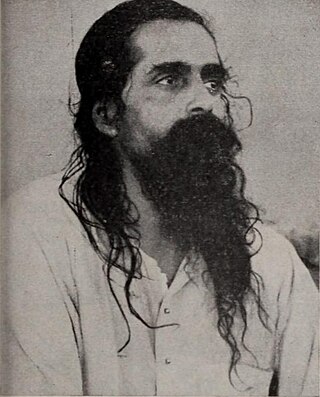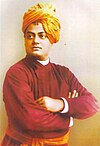
Swami Vivekananda, born Narendranath Datta was an Indian Hindu monk, philosopher, author, religious teacher, and the chief disciple of the Indian mystic Ramakrishna. He was a key figure in the introduction of Vedanta and Yoga to the Western world. He is credited with raising interfaith awareness and bringing Hinduism to the status of a major world religion in the late nineteenth century.

Rashtriya Swayamsevak Sangh is an Indian right-wing, Hindu nationalist volunteer paramilitary organisation. It is the progenitor and leader of a large body of organisations called the Sangh Parivar, which has developed a presence in all facets of Indian society and includes the Bharatiya Janata Party, the ruling political party under Narendra Modi, the 14th prime minister of India. Mohan Bhagwat has served as the Sarsanghchalak of the RSS since March 2009.
The following outline is provided as an overview of and topical guide to Hinduism:
The Sangh Parivar refers, as an umbrella term, to the collection of Hindutva organisations spawned by the Rashtriya Swayamsevak Sangh (RSS), which remain affiliated to it. These include the political party Bharatiya Janata Party, religious organisation Vishva Hindu Parishad, students union Akhil Bharatiya Vidyarthi Parishad (ABVP), religious militant organisation Bajrang Dal that forms the youth wing of the Vishva Hindu Parishad (VHP), and the worker's union Bharatiya Kisan Sangh.

Dr.Keshav Baliram Hedgewar, also known by his moniker Doctorji was a Hindutva activist, physician and the founder of the Rashtriya Swayamsevak Sangh (RSS). Hedgewar founded the RSS in Nagpur in 1925, based on the ideology of Hindu nationalism.
Vivekananda Kendra is a Hindu nationalist social service and nation-building organisation, claiming to represent the heritage of Swami Vivekananda. the organisation is based near the Vivekananda Rock Memorial in Kanyakumari.

Madhav Sadashivrao Golwalkar, popularly known as Guruji, was the second Sarsanghchalak ("Chief") of the Hindutva organisation Rashtriya Swayamsevak Sangh (RSS). Golwalkar is considered one of the most influential and prominent figures among Rashtriya Swayamsevak Sangh by his followers.

Vivekananda Rock Memorial is a monument and popular tourist attraction in Kanyakumari, India's southernmost tip. The memorial stands on one of the two rocks located about 500 meters off mainland of Vavathurai, Tamil Nadu. It was built in 1970 in honour of Swami Vivekananda, who is said to have attained enlightenment on the rock.

P. Parameswaran, often referred to as Parameswarji, was a Rashtriya Swayamsevak Sangh (RSS) pracharak from Kerala, India who was erstwhile Vice‑President of the Jan Sangh.

Minjur Bhakthavatsalam was an Indian independence activist and politician who served as the chief minister of Madras State from 2 October 1963 to 6 March 1967. He was the last Congress chief minister of Tamil Nadu and the last to have taken part in the Indian independence movement.
Walter K. Andersen is an American academic known for his studies of the Rashtriya Swayamsevak Sangh (RSS) – a Hindu nationalist organization. He currently serves as Senior Adjunct Professor of South Asia Studies at Johns Hopkins University Paul H. Nitze School of Advanced International Studies and is a part of the faculty of Tongji University, Shanghai (China). Previously, he taught comparative politics at the College of Wooster before joining the United States State Department as a political analyst for South Asia specializing in India and Indian Ocean affairs. Additionally, he was an adjunct professor at The American University in Washington, D.C.

The Rashtra Sevika Samiti is a Hindu nationalist women's organisation that parallels the Rashtriya Swayamsevak Sangh (RSS) for men. Even though it is often referred to as the "Sister" of the RSS, the organisation claims that it is independent of the RSS while sharing its ideology. Membership and leadership is embraced to women and its activities are directed to nationalist devotion and mobilisation of Hindu women.
The Rashtriya Sikh Sangat is an India-based Sikh affiliate of the Rashtriya Swayamsevak Sangh (RSS)
Hindu terrorism, sometimes called Hindutva terror or, metonymically, saffron terror, refer to terrorist acts carried out on the basis of motivations in broad association with Hindu nationalism or Hindutva.

Eknath Ramakrishna Ranade was a social activist and right-wing leader. He joined the Rashtriya Swayamsevak Sangh (RSS) while in school and served as its general secretary from 1956 to 1962.
Hindu nationalism has been collectively referred to as the expression of political thought, based on the native social and cultural traditions of the Indian subcontinent. "Hindu nationalism" is a simplistic translation of Hindū Rāṣṭravāda. It is better described as "Hindu polity".

Swami Vivekananda, the nineteenth-century Indian Hindu monk, is considered one of the most influential people of modern India and Hinduism. Rabindranath Tagore suggested to study Vivekananda's works to learn about India. Indian independence activist Subhas Chandra Bose regarded Vivekananda as his spiritual teacher. Mahatma Gandhi said that after reading the works of Vivekananda, his love for his nation became a thousand-fold.
These are the references for further information regarding the Sangh Parivar.
In 1888, Swami Vivekananda left the monastery as a Parivrâjaka— the Hindu religious life of a wandering monk, "without fixed abode, without ties, independent and strangers wherever they go". His sole possessions were a kamandalu, staff and his two favourite books: the Bhagavad Gita and The Imitation of Christ. Narendra travelled extensively in India for five years, visiting centres of learning and acquainting himself with diverse religious traditions and social patterns. He developed sympathy for the suffering and poverty of the people, and resolved to uplift the nation. Living primarily on bhiksha (alms), Swami Vivekananda travelled on foot and by railway. During his travels he met, and stayed with Indians from all religions and walks of life: scholars, dewans, rajas, Hindus, Muslims, Christians, paraiyars and government officials.











